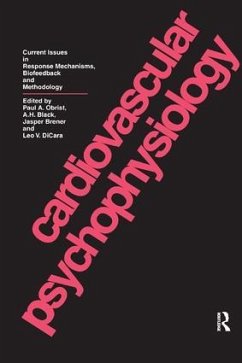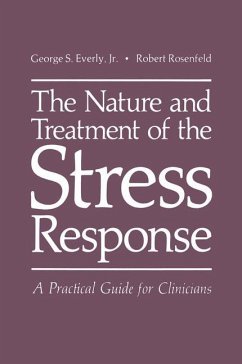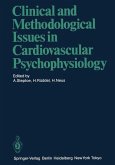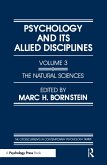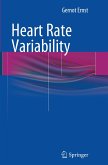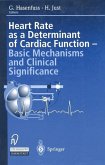Paul A. Obrist, A. H. Black, Jasper Brener
Cardiovascular Psychophysiology
Current Issues in Response Mechanisms, Biofeedback and Methodology
Paul A. Obrist, A. H. Black, Jasper Brener
Cardiovascular Psychophysiology
Current Issues in Response Mechanisms, Biofeedback and Methodology
- Gebundenes Buch
- Merkliste
- Auf die Merkliste
- Bewerten Bewerten
- Teilen
- Produkt teilen
- Produkterinnerung
- Produkterinnerung
A comprehensive overview of the entire field of cardiovascular psychophysiology. This book provides an overview of the subject and the contemporary measurement techniques. It contains six experimental studies of cardiovascular function dealing with the interactive nature of cardiovascular and behavioral events.
Andere Kunden interessierten sich auch für
![The Nature and Treatment of the Stress Response The Nature and Treatment of the Stress Response]() George S. EverlyThe Nature and Treatment of the Stress Response39,99 €
George S. EverlyThe Nature and Treatment of the Stress Response39,99 €![Clinical and Methodological Issues in Cardiovascular Psychophysiology Clinical and Methodological Issues in Cardiovascular Psychophysiology]() Clinical and Methodological Issues in Cardiovascular Psychophysiology39,99 €
Clinical and Methodological Issues in Cardiovascular Psychophysiology39,99 €![Psychology and Its Allied Disciplines Psychology and Its Allied Disciplines]() Psychology and Its Allied Disciplines23,99 €
Psychology and Its Allied Disciplines23,99 €![Heart Rate Variability Heart Rate Variability]() Gernot ErnstHeart Rate Variability86,99 €
Gernot ErnstHeart Rate Variability86,99 €![Attachment Behavior Attachment Behavior]() Attachment Behavior39,99 €
Attachment Behavior39,99 €![Heart rate as a determinant of cardiac function Heart rate as a determinant of cardiac function]() Heart rate as a determinant of cardiac function75,99 €
Heart rate as a determinant of cardiac function75,99 €![From Axons to Identity: Neurological Explorations of the Nature of the Self From Axons to Identity: Neurological Explorations of the Nature of the Self]() Todd E. FeinbergFrom Axons to Identity: Neurological Explorations of the Nature of the Self21,99 €
Todd E. FeinbergFrom Axons to Identity: Neurological Explorations of the Nature of the Self21,99 €-
-
-
A comprehensive overview of the entire field of cardiovascular psychophysiology. This book provides an overview of the subject and the contemporary measurement techniques. It contains six experimental studies of cardiovascular function dealing with the interactive nature of cardiovascular and behavioral events.
Hinweis: Dieser Artikel kann nur an eine deutsche Lieferadresse ausgeliefert werden.
Hinweis: Dieser Artikel kann nur an eine deutsche Lieferadresse ausgeliefert werden.
Produktdetails
- Produktdetails
- Verlag: Routledge
- Seitenzahl: 678
- Erscheinungstermin: 15. August 2017
- Englisch
- Abmessung: 235mm x 157mm x 41mm
- Gewicht: 1117g
- ISBN-13: 9781138520004
- ISBN-10: 1138520004
- Artikelnr.: 49439696
- Herstellerkennzeichnung
- Libri GmbH
- Europaallee 1
- 36244 Bad Hersfeld
- gpsr@libri.de
- Verlag: Routledge
- Seitenzahl: 678
- Erscheinungstermin: 15. August 2017
- Englisch
- Abmessung: 235mm x 157mm x 41mm
- Gewicht: 1117g
- ISBN-13: 9781138520004
- ISBN-10: 1138520004
- Artikelnr.: 49439696
- Herstellerkennzeichnung
- Libri GmbH
- Europaallee 1
- 36244 Bad Hersfeld
- gpsr@libri.de
Paul A. Obrist, A.H. Black, Jasper Brener, Leo V. DiCara
I: Cardiovascular Function and Measurement
1: Mechanisms of the Cardiovascular Responses to Environmental Stressors
2: A Selective Review of Central Neural Pathways Involved in Cardiovascular Control
3: Psychophysiology of Peripheral Vascular Changes
4: Indirect Indices of Contractile Force
5: The Indirect Recording of Human Blood Pressure
6: Techniques for Long-Term Direct Measurements of Cardiovascular Variables
II: Cardiovascular Function - Experimental Studies
7: Analysis of the Final Common Path for Heart Rate Conditioning
8: The Cardiac-Somatic Interaction
9: Comparative Psychophysiology of the Electrodermal and Cardiac Control Systems
10: The Relationship Between Learned and Unlearned Cardiovascular Responses
11: Sympathetic and Parasympathetic Activity During Behavioral Hypertension in the Squirrel Monkey
III: Animal Operant Conditioning
12: Operant Autonomic Conditioning: The Analysis of Response Mechanisms
13: Respiratory and Somatomotor Factors Associated with Operant Conditioning of Cardiovascular Responses in Curarized Rats
14: Some Critical Methodological Variables Involved in Visceral Learning
15: The Learning of Autonomie Responses by Curarized Animals
16: Visceral Learning: Recent Difficulties with Curarized Rats and Significant Problems for Human Research
17: Comparative Studies of Operant Electrodermal and Heart Rate Conditioning in Curarized Rats
18: Some Problems in the Use of Neuromuscular Blockade
IV: Human Operant Conditioning
19: A General Model of Voluntary Control Applied to the Phenomena of Learned Cardiovascular Change
20: Learned Control of Human Heart Rate in a Computer Directed Environment
21: Toward a Theory of Voluntary Control of Response Patterns in the Cardiovascular System
22: Opérant-Feedback Control of Human Blood Pressure: Some Clinical Issues
23: Application of Operant Conditioning Techniques to the Control of the Cardiac Arrhythmias
V: Heart Rate - Attentional and Motivational Processes
24: Cardiac Conditioning and Orienting in the Infant
25: The Motivational Significance of Heart Rate
26: Studies of Heart Rate and Other Bodily Processes in Sensorimotor Behavior
Summary
1: Mechanisms of the Cardiovascular Responses to Environmental Stressors
2: A Selective Review of Central Neural Pathways Involved in Cardiovascular Control
3: Psychophysiology of Peripheral Vascular Changes
4: Indirect Indices of Contractile Force
5: The Indirect Recording of Human Blood Pressure
6: Techniques for Long-Term Direct Measurements of Cardiovascular Variables
II: Cardiovascular Function - Experimental Studies
7: Analysis of the Final Common Path for Heart Rate Conditioning
8: The Cardiac-Somatic Interaction
9: Comparative Psychophysiology of the Electrodermal and Cardiac Control Systems
10: The Relationship Between Learned and Unlearned Cardiovascular Responses
11: Sympathetic and Parasympathetic Activity During Behavioral Hypertension in the Squirrel Monkey
III: Animal Operant Conditioning
12: Operant Autonomic Conditioning: The Analysis of Response Mechanisms
13: Respiratory and Somatomotor Factors Associated with Operant Conditioning of Cardiovascular Responses in Curarized Rats
14: Some Critical Methodological Variables Involved in Visceral Learning
15: The Learning of Autonomie Responses by Curarized Animals
16: Visceral Learning: Recent Difficulties with Curarized Rats and Significant Problems for Human Research
17: Comparative Studies of Operant Electrodermal and Heart Rate Conditioning in Curarized Rats
18: Some Problems in the Use of Neuromuscular Blockade
IV: Human Operant Conditioning
19: A General Model of Voluntary Control Applied to the Phenomena of Learned Cardiovascular Change
20: Learned Control of Human Heart Rate in a Computer Directed Environment
21: Toward a Theory of Voluntary Control of Response Patterns in the Cardiovascular System
22: Opérant-Feedback Control of Human Blood Pressure: Some Clinical Issues
23: Application of Operant Conditioning Techniques to the Control of the Cardiac Arrhythmias
V: Heart Rate - Attentional and Motivational Processes
24: Cardiac Conditioning and Orienting in the Infant
25: The Motivational Significance of Heart Rate
26: Studies of Heart Rate and Other Bodily Processes in Sensorimotor Behavior
Summary
I: Cardiovascular Function and Measurement; 1: Mechanisms of the Cardiovascular Responses to Environmental Stressors; 2: A Selective Review of Central Neural Pathways Involved in Cardiovascular Control; 3: Psychophysiology of Peripheral Vascular Changes; 4: Indirect Indices of Contractile Force; 5: The Indirect Recording of Human Blood Pressure; 6: Techniques for Long-Term Direct Measurements of Cardiovascular Variables; II: Cardiovascular Function - Experimental Studies; 7: Analysis of the Final Common Path for Heart Rate Conditioning; 8: The Cardiac-Somatic Interaction; 9: Comparative Psychophysiology of the Electrodermal and Cardiac Control Systems; 10: The Relationship Between Learned and Unlearned Cardiovascular Responses; 11: Sympathetic and Parasympathetic Activity During Behavioral Hypertension in the Squirrel Monkey; III: Animal Operant Conditioning; 12: Operant Autonomic Conditioning: The Analysis of Response Mechanisms; 13: Respiratory and Somatomotor Factors Associated with Operant Conditioning of Cardiovascular Responses in Curarized Rats; 14: Some Critical Methodological Variables Involved in Visceral Learning; 15: The Learning of Autonomie Responses by Curarized Animals; 16: Visceral Learning: Recent Difficulties with Curarized Rats and Significant Problems for Human Research; 17: Comparative Studies of Operant Electrodermal and Heart Rate Conditioning in Curarized Rats; 18: Some Problems in the Use of Neuromuscular Blockade; IV: Human Operant Conditioning; 19: A General Model of Voluntary Control Applied to the Phenomena of Learned Cardiovascular Change; 20: Learned Control of Human Heart Rate in a Computer Directed Environment; 21: Toward a Theory of Voluntary Control of Response Patterns in the Cardiovascular System; 22: Opérant-Feedback Control of Human Blood Pressure: Some Clinical Issues; 23: Application of Operant Conditioning Techniques to the Control of the Cardiac Arrhythmias; V: Heart Rate - Attentional and Motivational Processes; 24: Cardiac Conditioning and Orienting in the Infant; 25: The Motivational Significance of Heart Rate; 26: Studies of Heart Rate and Other Bodily Processes in Sensorimotor Behavior; Summary
I: Cardiovascular Function and Measurement
1: Mechanisms of the Cardiovascular Responses to Environmental Stressors
2: A Selective Review of Central Neural Pathways Involved in Cardiovascular Control
3: Psychophysiology of Peripheral Vascular Changes
4: Indirect Indices of Contractile Force
5: The Indirect Recording of Human Blood Pressure
6: Techniques for Long-Term Direct Measurements of Cardiovascular Variables
II: Cardiovascular Function - Experimental Studies
7: Analysis of the Final Common Path for Heart Rate Conditioning
8: The Cardiac-Somatic Interaction
9: Comparative Psychophysiology of the Electrodermal and Cardiac Control Systems
10: The Relationship Between Learned and Unlearned Cardiovascular Responses
11: Sympathetic and Parasympathetic Activity During Behavioral Hypertension in the Squirrel Monkey
III: Animal Operant Conditioning
12: Operant Autonomic Conditioning: The Analysis of Response Mechanisms
13: Respiratory and Somatomotor Factors Associated with Operant Conditioning of Cardiovascular Responses in Curarized Rats
14: Some Critical Methodological Variables Involved in Visceral Learning
15: The Learning of Autonomie Responses by Curarized Animals
16: Visceral Learning: Recent Difficulties with Curarized Rats and Significant Problems for Human Research
17: Comparative Studies of Operant Electrodermal and Heart Rate Conditioning in Curarized Rats
18: Some Problems in the Use of Neuromuscular Blockade
IV: Human Operant Conditioning
19: A General Model of Voluntary Control Applied to the Phenomena of Learned Cardiovascular Change
20: Learned Control of Human Heart Rate in a Computer Directed Environment
21: Toward a Theory of Voluntary Control of Response Patterns in the Cardiovascular System
22: Opérant-Feedback Control of Human Blood Pressure: Some Clinical Issues
23: Application of Operant Conditioning Techniques to the Control of the Cardiac Arrhythmias
V: Heart Rate - Attentional and Motivational Processes
24: Cardiac Conditioning and Orienting in the Infant
25: The Motivational Significance of Heart Rate
26: Studies of Heart Rate and Other Bodily Processes in Sensorimotor Behavior
Summary
1: Mechanisms of the Cardiovascular Responses to Environmental Stressors
2: A Selective Review of Central Neural Pathways Involved in Cardiovascular Control
3: Psychophysiology of Peripheral Vascular Changes
4: Indirect Indices of Contractile Force
5: The Indirect Recording of Human Blood Pressure
6: Techniques for Long-Term Direct Measurements of Cardiovascular Variables
II: Cardiovascular Function - Experimental Studies
7: Analysis of the Final Common Path for Heart Rate Conditioning
8: The Cardiac-Somatic Interaction
9: Comparative Psychophysiology of the Electrodermal and Cardiac Control Systems
10: The Relationship Between Learned and Unlearned Cardiovascular Responses
11: Sympathetic and Parasympathetic Activity During Behavioral Hypertension in the Squirrel Monkey
III: Animal Operant Conditioning
12: Operant Autonomic Conditioning: The Analysis of Response Mechanisms
13: Respiratory and Somatomotor Factors Associated with Operant Conditioning of Cardiovascular Responses in Curarized Rats
14: Some Critical Methodological Variables Involved in Visceral Learning
15: The Learning of Autonomie Responses by Curarized Animals
16: Visceral Learning: Recent Difficulties with Curarized Rats and Significant Problems for Human Research
17: Comparative Studies of Operant Electrodermal and Heart Rate Conditioning in Curarized Rats
18: Some Problems in the Use of Neuromuscular Blockade
IV: Human Operant Conditioning
19: A General Model of Voluntary Control Applied to the Phenomena of Learned Cardiovascular Change
20: Learned Control of Human Heart Rate in a Computer Directed Environment
21: Toward a Theory of Voluntary Control of Response Patterns in the Cardiovascular System
22: Opérant-Feedback Control of Human Blood Pressure: Some Clinical Issues
23: Application of Operant Conditioning Techniques to the Control of the Cardiac Arrhythmias
V: Heart Rate - Attentional and Motivational Processes
24: Cardiac Conditioning and Orienting in the Infant
25: The Motivational Significance of Heart Rate
26: Studies of Heart Rate and Other Bodily Processes in Sensorimotor Behavior
Summary
I: Cardiovascular Function and Measurement; 1: Mechanisms of the Cardiovascular Responses to Environmental Stressors; 2: A Selective Review of Central Neural Pathways Involved in Cardiovascular Control; 3: Psychophysiology of Peripheral Vascular Changes; 4: Indirect Indices of Contractile Force; 5: The Indirect Recording of Human Blood Pressure; 6: Techniques for Long-Term Direct Measurements of Cardiovascular Variables; II: Cardiovascular Function - Experimental Studies; 7: Analysis of the Final Common Path for Heart Rate Conditioning; 8: The Cardiac-Somatic Interaction; 9: Comparative Psychophysiology of the Electrodermal and Cardiac Control Systems; 10: The Relationship Between Learned and Unlearned Cardiovascular Responses; 11: Sympathetic and Parasympathetic Activity During Behavioral Hypertension in the Squirrel Monkey; III: Animal Operant Conditioning; 12: Operant Autonomic Conditioning: The Analysis of Response Mechanisms; 13: Respiratory and Somatomotor Factors Associated with Operant Conditioning of Cardiovascular Responses in Curarized Rats; 14: Some Critical Methodological Variables Involved in Visceral Learning; 15: The Learning of Autonomie Responses by Curarized Animals; 16: Visceral Learning: Recent Difficulties with Curarized Rats and Significant Problems for Human Research; 17: Comparative Studies of Operant Electrodermal and Heart Rate Conditioning in Curarized Rats; 18: Some Problems in the Use of Neuromuscular Blockade; IV: Human Operant Conditioning; 19: A General Model of Voluntary Control Applied to the Phenomena of Learned Cardiovascular Change; 20: Learned Control of Human Heart Rate in a Computer Directed Environment; 21: Toward a Theory of Voluntary Control of Response Patterns in the Cardiovascular System; 22: Opérant-Feedback Control of Human Blood Pressure: Some Clinical Issues; 23: Application of Operant Conditioning Techniques to the Control of the Cardiac Arrhythmias; V: Heart Rate - Attentional and Motivational Processes; 24: Cardiac Conditioning and Orienting in the Infant; 25: The Motivational Significance of Heart Rate; 26: Studies of Heart Rate and Other Bodily Processes in Sensorimotor Behavior; Summary

